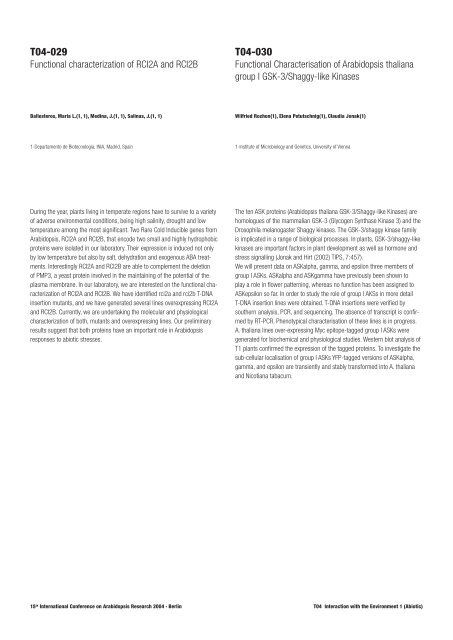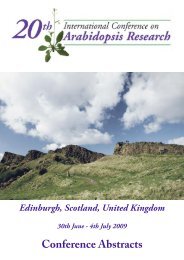- Page 1:
15 th International</strong
- Page 4 and 5:
Imprint Abstract Book of the 15 th
- Page 6 and 7:
15 th International</strong
- Page 8 and 9:
15 th International</strong
- Page 10 and 11:
The Meeting Sponsors www.affymetrix
- Page 12 and 13:
Programme Overview Tuesday ECCA 9:0
- Page 14 and 15:
Detailed Programme ECCR1 Interactio
- Page 16 and 17:
Detailed Programme Wednesday ECCA 9
- Page 18 and 19:
T01 Development 1 (Flower, Fertiliz
- Page 20 and 21:
T01-027 EMBRYONIC FACTOR 1 (FAC1),
- Page 22 and 23:
T01-053 Intercellular protein traff
- Page 24 and 25:
T01-080 Identification of enhancers
- Page 26 and 27:
T02-004 Length and width: Both cell
- Page 28 and 29:
T02-031 A suppressor screening of j
- Page 30 and 31:
T02-057 Genetic and biochemical evi
- Page 32 and 33:
T02-084 Identifying Targets of Indu
- Page 34 and 35:
T02-110 Expression of the bHLH gene
- Page 36 and 37:
T03-015 Knock-out of the Mg-protopo
- Page 38 and 39:
T03-042 DISTORTED2 encodes for the
- Page 40 and 41:
T03-070 Towards a transcript profil
- Page 42 and 43:
T04-009 Transcriptional Regulation
- Page 44 and 45:
T04-035 Identification of sugar-reg
- Page 46 and 47:
T04-060 Functional analysis of two
- Page 48 and 49:
T04-087 A rice calcium binding prot
- Page 50 and 51:
T04-111 Abiotic stress signaling an
- Page 52 and 53:
T05-022 Searching For Novel Compone
- Page 54 and 55:
T05-048 Bacillus as beneficial bact
- Page 56 and 57:
T05-075 Identification of General a
- Page 58 and 59:
T06-009 Natural Variation of Flower
- Page 60 and 61:
T07 Metabolism (Primary, Secondary,
- Page 62 and 63:
T07-025 gamma-aminobutyric acid (GA
- Page 64 and 65:
T07-052 Systematic in-depth analysi
- Page 66 and 67:
T07-077 Obtusifoliol 14alpha-demeth
- Page 68 and 69:
T08-003 Patterning of plants by aux
- Page 70 and 71:
T09-010 Functional identification o
- Page 72 and 73:
T09-035 AtERF2 is a Positive Regula
- Page 74 and 75:
T09-062 Functional characterization
- Page 76 and 77:
T10-026 Laser microdissection: A to
- Page 78 and 79:
T10-053 Identification of genetic r
- Page 80 and 81:
T11-022 TAIR (The Arabidopsis Infor
- Page 82 and 83:
T12-018 Altered apyrase activity in
- Page 84 and 85:
T13-014 Functional Analysis of Arab
- Page 87 and 88:
T01-001 AtBRM, an ATPase of the SNF
- Page 89 and 90:
T01-005 PATTERN OF FUNCTIONAL EVOLU
- Page 91 and 92:
T01-009 Molecular analysis of flora
- Page 93 and 94:
T01-013 Roles of DELLA Proteins in
- Page 95 and 96:
T01-017 Molecular variation of CONS
- Page 97 and 98:
T01-021 Pollen specific MADS-box ge
- Page 99 and 100:
T01-025 'Integument-led' seed growt
- Page 101 and 102:
T01-029 Molecular mechanism of flor
- Page 103 and 104:
T01-033 FLOWERING LOCUS T as a link
- Page 105 and 106:
T01-037 Identification and characte
- Page 107 and 108:
T01-041 Methods to identify in vivo
- Page 109 and 110:
T01-045 Characterization of TSF, a
- Page 111 and 112:
T01-049 ENHANCERS OF LUMINIDEPENDEN
- Page 113 and 114:
T01-053 Intercellular protein traff
- Page 115 and 116:
T01-057 Exploiting the non-flowerin
- Page 117 and 118:
T01-061 TRANSPARENT TESTA1 controls
- Page 119 and 120:
T01-065 STY genes and Auxin in Arab
- Page 121 and 122:
T01-069 DAG1 and DAG2: two Arabidop
- Page 123 and 124:
T01-073 Characterization of The van
- Page 125 and 126:
T01-077 Functional analysis of SBP
- Page 127 and 128:
T01-081 Characterization and mappin
- Page 129 and 130:
T01-085 Patterns of Gene Expression
- Page 131 and 132:
T01-089 LOV1 is a floral repressor
- Page 133 and 134:
T01-093 SHI family genes redundantl
- Page 135 and 136:
T01-097 The Arabidopsis formin AtFH
- Page 137 and 138:
T01-101 Interaction of Polycomb-gro
- Page 139:
T02 Development 2 (Shoot, Root)
- Page 142 and 143:
T02-003 Arabidopsis auxin influx pr
- Page 144 and 145:
T02-007 A novel class of Arabidopsi
- Page 146 and 147:
T02-011 A model of Arabidopsis leaf
- Page 148 and 149:
T02-015 Micro-RNA targeted TCP gene
- Page 150 and 151:
T02-019 Modulation of light (phytoc
- Page 152 and 153:
T02-023 FIC, a Factor Interacting w
- Page 154 and 155:
T02-027 HORMONAL MEDIATION OF KNOX
- Page 156 and 157:
T02-031 A suppressor screening of j
- Page 158 and 159:
T02-035 ead1, an orthologue of a hu
- Page 160 and 161:
T02-039 “Overexpression of CDK in
- Page 162 and 163:
T02-043 Analysis of the distributio
- Page 164 and 165:
T02-047 At1g36390 is highly conserv
- Page 166 and 167:
T02-051 CYTOKININ RESPONSE GENES OF
- Page 168 and 169:
T02-055 Vascular bundle differentia
- Page 170 and 171:
T02-059 ROT3 and ROT3 homolog, whic
- Page 172 and 173:
T02-063 The cell-autonomous ANGUSTI
- Page 174 and 175:
T02-067 TYPE-B RESPONSE REGULATORS
- Page 176 and 177:
T02-071 Diverse activities of Mei2-
- Page 178 and 179:
T02-075 Large-scale analysis of nuc
- Page 180 and 181:
T02-079 Biological function studies
- Page 182 and 183:
T02-083 Isolation and characterizat
- Page 184 and 185:
T02-087 Regulation of LATERAL SUPPR
- Page 186 and 187:
T02-091 Isolation of two novel puta
- Page 188 and 189:
T02-095 PLETHORA1 and PLETHORA2 are
- Page 190 and 191:
T02-099 Regulatory Mechanisms in Sh
- Page 192 and 193:
T02-103 A mutational analysis of th
- Page 194 and 195:
T02-107 Characterization of cell ty
- Page 196 and 197:
T02-111 The cyclophilin AtCyp95 reg
- Page 198 and 199:
T02-115 Genetic Analysis of Vascula
- Page 200 and 201:
T02-119 AtRaptor and meristem activ
- Page 202 and 203:
T02 Development 2 (Shoot, Root) 15
- Page 205 and 206:
T03-001 Mitochondrial Biogenesis in
- Page 207 and 208:
T03-005 The N-end rule pathway for
- Page 209 and 210:
T03-009 Cellulose biosynthesis and
- Page 211 and 212:
T03-013 Has the Arabidopsis NAC dom
- Page 213 and 214: T03-017 PAS1 immunophilin targets a
- Page 215 and 216: T03-021 Localization of an ascorbat
- Page 217 and 218: T03-025 Genetic dissection of mucil
- Page 219 and 220: T03-029 Comprehensive oligo-microar
- Page 221 and 222: T03-033 The Arabidopsis co-chaperon
- Page 223 and 224: T03-037 The chloroplast SRP-pathway
- Page 225 and 226: T03-041 Stability of Microtubules C
- Page 227 and 228: T03-045 Identification and Characte
- Page 229 and 230: T03-049 Isolation and characterizat
- Page 231 and 232: T03-053 Global transcription analys
- Page 233 and 234: T03-057 A Proteomic Analysis of Lea
- Page 235 and 236: T03-061 Isolation of mutants affect
- Page 237 and 238: T03-065 Function and differentiatio
- Page 239 and 240: T03-069 Shaping plant cells using a
- Page 241 and 242: T03-073 Mitosis-specific accumulati
- Page 243 and 244: T03-077 A journey through the plant
- Page 245 and 246: T03-081 Regulated degradation of AU
- Page 247: T03-085 Towards analysis of the Ara
- Page 251 and 252: T04-001 Towards Understanding Chang
- Page 253 and 254: T04-005 The Basic Helix-Loop-Helix
- Page 255 and 256: T04-009 Transcriptional Regulation
- Page 257 and 258: T04-013 Plant Modulates Its Genome
- Page 259 and 260: T04-017 The Arabidopsis AtMYB60 tra
- Page 261 and 262: T04-021 Identification of a new ABA
- Page 263: T04-025 DegP1 Protease in Arabidops
- Page 267 and 268: T04-033 The location of QTL for nut
- Page 269 and 270: T04-037 Characterization of environ
- Page 271 and 272: T04-041 Expression pattern and phys
- Page 273 and 274: T04-045 Locating Sodium Chloride As
- Page 275 and 276: T04-049 The tup5 mutant shows blue
- Page 277 and 278: T04-053 Transcriptional regulation
- Page 279 and 280: T04-057 The SPA1 family: WD-repeat
- Page 281 and 282: T04-061 LOW-LIGHT- AND ETHYLENE-IND
- Page 283 and 284: T04-065 "Genetical genomics" of pet
- Page 285 and 286: T04-069 Comparative micro-array ana
- Page 287 and 288: T04-073 CHARACTERIZATION OF COL3, A
- Page 289 and 290: T04-077 P-regulated transcription f
- Page 291 and 292: T04-081 AN ARABIDOPSIS THALIANA T-D
- Page 293 and 294: T04-085 Functional Genomics of Absc
- Page 295 and 296: T04-089 Molecular genetic character
- Page 297 and 298: T04-093 The model system Arabidopsi
- Page 299 and 300: T04-097 Using Arabidopsis thaliana
- Page 301 and 302: T04-101 Characterization of QTL und
- Page 303 and 304: T04-105 Crosstalk and differential
- Page 305 and 306: T04-109 SRR1, a gene involved in ph
- Page 307: 15 th International</strong
- Page 311 and 312: T05-001 Immunolocalization of a Fus
- Page 313 and 314: T05-005 Genomewide transcriptional
- Page 315 and 316:
T05-009 Is Annexin 1 involved in ce
- Page 317 and 318:
T05-013 Virulent bacterial pathogen
- Page 319 and 320:
T05-017 Regulation of Cell Death in
- Page 321 and 322:
T05-021 Mutations in Arabidopsis RI
- Page 323 and 324:
T05-025 Reactive Oxygen species (RO
- Page 325 and 326:
T05-029 An Arabidopsis Mlo knock-ou
- Page 327 and 328:
T05-033 RepA protein from geminivir
- Page 329 and 330:
T05-037 Aquaporin genes regulated b
- Page 331 and 332:
T05-041 Systematic analysis of cyto
- Page 333 and 334:
T05-045 Investigating the basis for
- Page 335 and 336:
T05-049 FERMENTING OVER A COMPLEX M
- Page 337 and 338:
T05-053 Genetic dissection of non-h
- Page 339 and 340:
T05-057 ARF-GTPases in plant pathog
- Page 341 and 342:
T05-061 Elongation factor Tu ¯ a n
- Page 343 and 344:
T05-065 Physiological plasticity of
- Page 345 and 346:
T05-069 Cell-specific Gene Activati
- Page 347 and 348:
T05-073 The PEN1 syntaxin defines a
- Page 349 and 350:
T05-077 RPM1-interacting protein RI
- Page 351 and 352:
T05-081 The BIK1 gene of Arabidopsi
- Page 353 and 354:
T05-085 Prediction of multiple Arab
- Page 355:
T05-89 Compositional changes in the
- Page 359 and 360:
T06-001 Transposon Activation in Ar
- Page 361 and 362:
T06-005 Quantitative trait locus an
- Page 363 and 364:
T06-009 Natural Variation of Flower
- Page 365 and 366:
T06-013 Trichome evolution in tetra
- Page 367 and 368:
T06-017 Investigation of the molecu
- Page 369 and 370:
T06-021 Gene Subfunctionalization a
- Page 371 and 372:
T06-025 A floral homeotic polymorph
- Page 373 and 374:
T06-029 Adaptive trait genes in Ara
- Page 375:
T06-033 Heterosis and transcriptome
- Page 379 and 380:
T07-001 The At4g12720 gene encoding
- Page 381 and 382:
T07-005 Roles of BOR1 homologs in B
- Page 383 and 384:
T07-009 Arabidopsis thaliana P450 t
- Page 385 and 386:
T07-013 Expression profiling and fu
- Page 387 and 388:
T07-017 A biotechnological approach
- Page 389 and 390:
T07-021 Equilibrative nucleoside tr
- Page 391 and 392:
T07-025 gamma-aminobutyric acid (GA
- Page 393 and 394:
T07-029 Genetically encoded sensors
- Page 395 and 396:
T07-033 The role of the oxPPP durin
- Page 397 and 398:
T07-037 a mutation in the sucrose t
- Page 399 and 400:
T07-041 A Systems Approach to Nitro
- Page 401 and 402:
T07-045 Overexpression of a specifi
- Page 403 and 404:
T07-049 Expression profile and func
- Page 405 and 406:
T07-053 Soluble Cytosolic Heterogly
- Page 407 and 408:
T07-057 A FUNCTIONAL GENOMICS APPRO
- Page 409 and 410:
T07-061 Structure-Function Relation
- Page 411 and 412:
T07-065 Loss of the hydroxypyruvate
- Page 413 and 414:
T07-069 Structure-Based Design of 4
- Page 415 and 416:
T07-073 Role of chloroplast lipids
- Page 417 and 418:
T07-077 Obtusifoliol 14alpha-demeth
- Page 419 and 420:
T07-081 Identification and function
- Page 421 and 422:
T07-85 The IPMS/MAM gene family of
- Page 423 and 424:
T07-089 Accelerated senescence and
- Page 425 and 426:
T07-093 Regulation of the Anthocyan
- Page 427:
T07-097 Ionomics: Gene Discovery in
- Page 431 and 432:
T08-001 Involvement of DIR1, a puta
- Page 433 and 434:
T08-005 Expression profiling of mem
- Page 435 and 436:
T08-009 C8 GIPK, a GAI-interacting
- Page 437 and 438:
T08-013 Phosphate signaling in Arab
- Page 439 and 440:
T08-017 Role Of Protein Phosphoryla
- Page 441:
T09 Genetic Mechanisms (Transcripti
- Page 444 and 445:
T09-003 Nuclear transcriptional con
- Page 446 and 447:
T09-007 Two BRCA2-like genes are ne
- Page 448 and 449:
T09-011 TT2, TT8, and TTG1 synergis
- Page 450 and 451:
T09-015 Expression and Functional C
- Page 452 and 453:
T09-019 SCL14 ACTIVATES ACTIVATION
- Page 454 and 455:
T09-023 Role of E2F transcription f
- Page 456 and 457:
T09-027 Histone methylation and het
- Page 458 and 459:
T09-031 Alternating partnerships of
- Page 460 and 461:
T09-035 AtERF2 is a Positive Regula
- Page 462 and 463:
T09-039 Plant specific GAGA-binding
- Page 464 and 465:
T09-043 Signal pathway of the endop
- Page 466 and 467:
T09-047 Expression of nuclear genes
- Page 468 and 469:
T09-051 The INCURVATA2 gene is invo
- Page 470 and 471:
T09-055 Histone H1 is required for
- Page 472 and 473:
T09-059 Inheritance of methylation
- Page 475:
T10 Novel Tools, Techniques and Res
- Page 478 and 479:
T10-003 Quantitative Immunodetectio
- Page 480 and 481:
T10-007 A Comparison of Global gene
- Page 482 and 483:
T10-011 Plant resources database at
- Page 484 and 485:
T10-015 A method to isolate chlorop
- Page 486 and 487:
T10-019 Novel Gene Discovery in Ara
- Page 488 and 489:
T10-023 Real-Time RT-PCR profiling
- Page 490 and 491:
T10-027 Proteome analyses of differ
- Page 492 and 493:
T10-031 A novel approach to dissect
- Page 494 and 495:
T10-035 Integrative metabolic netwo
- Page 496 and 497:
what´s that????? T10-039 The Genom
- Page 498 and 499:
T10-043 Toward the high throughput
- Page 500 and 501:
T10-047 Insertional mutagenesis by
- Page 502 and 503:
T10-051 Development of a novel repo
- Page 504 and 505:
T10-055 GENOME-WIDE DISCOVERY OF TR
- Page 507 and 508:
T11-001 Formation of flower primord
- Page 509 and 510:
T11-005 AthaMap, an online resource
- Page 511 and 512:
T11-009 Non-Random Distribution of
- Page 513 and 514:
T11-013 DegP/HtrA proteases in plan
- Page 515 and 516:
T11-017 GABI-Primary Database: A Co
- Page 517 and 518:
T11-021 ARABI-COIL - an Arabidopsis
- Page 519 and 520:
T11-025 The Botany Affymetrix Datab
- Page 521:
T11-029 From Genes to Morphogenesis
- Page 525 and 526:
T12-001 Arabidopsis cannot survive
- Page 527 and 528:
T12-005 Development of three differ
- Page 529 and 530:
T12-009 Cold-induced pollen sterili
- Page 531 and 532:
T12-013 Two Zn-responsive metalloth
- Page 533 and 534:
T12-017 Cytokinin signaling in seco
- Page 535 and 536:
T12-021 Population biology of the o
- Page 537 and 538:
T12-025 Dissecting symbiotic nitrog
- Page 539:
T13 Others
- Page 542 and 543:
T13-003 SH2 proteins in plants : Th
- Page 544 and 545:
T13-007 Characterization of the Cul
- Page 546 and 547:
T13-011 Cell wall polysaccharide an
- Page 548 and 549:
T13-015 Dynamics of protein complex
- Page 550 and 551:
T13-019 DIURNAL CHANGES IN CYTOKINI
- Page 552 and 553:
A Aalen, Reidunn B. . . . . . . . .
- Page 554 and 555:
Block, Maryse A.. . . . . . . . . .
- Page 556 and 557:
Creelman, Bob . . . . . . . . . . .
- Page 558 and 559:
Finzi, Laura. . . . . . . . . . . .
- Page 560 and 561:
Hannah, Matthew A. . . . . . . . .
- Page 562 and 563:
Jackson, Angela . . . . . . . . . .
- Page 564 and 565:
Kroymann, Juergen. . . . . . . . .
- Page 566 and 567:
Mathur, Jaideep . . . . . . . . . .
- Page 568 and 569:
Nilsson, Lena . . . . . . . . . . .
- Page 570 and 571:
Rauh, Brad . . . . . . . . . . . .
- Page 572 and 573:
Schönrock, Nicole . . . . . . . .
- Page 574 and 575:
Takeda, Seiji . . . . . . . . . . .
- Page 576 and 577:
Weber, A. . . . . . . . . . . . . .
- Page 579 and 580:
Participants Mail Index
- Page 581 and 582:
C Cabral, Adriana .................
- Page 583 and 584:
Gremski, Kristina .................
- Page 585 and 586:
Lee, Hyun-Kyung ...................
- Page 587 and 588:
Ponce, María Ros .................
- Page 589 and 590:
Thelen, Jay J. ....................




